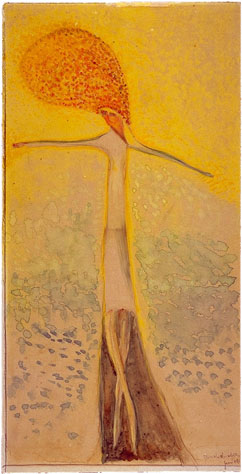Special Exhibition
3 May – 13 September 2002
Schönberg was brought up in the Jewish faith but in 1898 converted to Protestantism and was baptised in the Viennese Dorothee Parish. With his reconversion to Judaism in Paris in 1933 he made both a religious and national-political statement. The exhibition "Arnold Schönberg and his God" expresses his religious development in historical-biographical documents and works of art, a development that also helped shape the history of his oeuvre, and the varied artistic reflection of an inexpressible, ineducible God.
Special emphasis is placed on the sources of the unfinished oratorio "Die Jakobsleiter" as the concept of a monumental stage work and on the topic of the "confluence of a moderately skeptical realistic consciousness with faith" (Schönberg) likewise on the widely ranging documentary materials to the opera "Moses und Aron" (some shown here for the first time in Vienna), pinnacle of the religious-philosophical questions that forcibly arose from socio-political events of the 1920s. Arnold Schönberg was among those politically engaged intellectuals who early on recognized and spoke out against National Socialism – long before the Shoah became the object of journalistic interest and historical-political discourse. The manuscripts from his musical estate demonstrate the indivisibility of Schönberg's idea of God and a general ethical concept.
One part of the exhibition is devoted to the architectonic concept of the recently opened Jewish Museum of Daniel Libeskind in Berlin, which makes concrete reference to Schönberg's "Moses and Aron."

